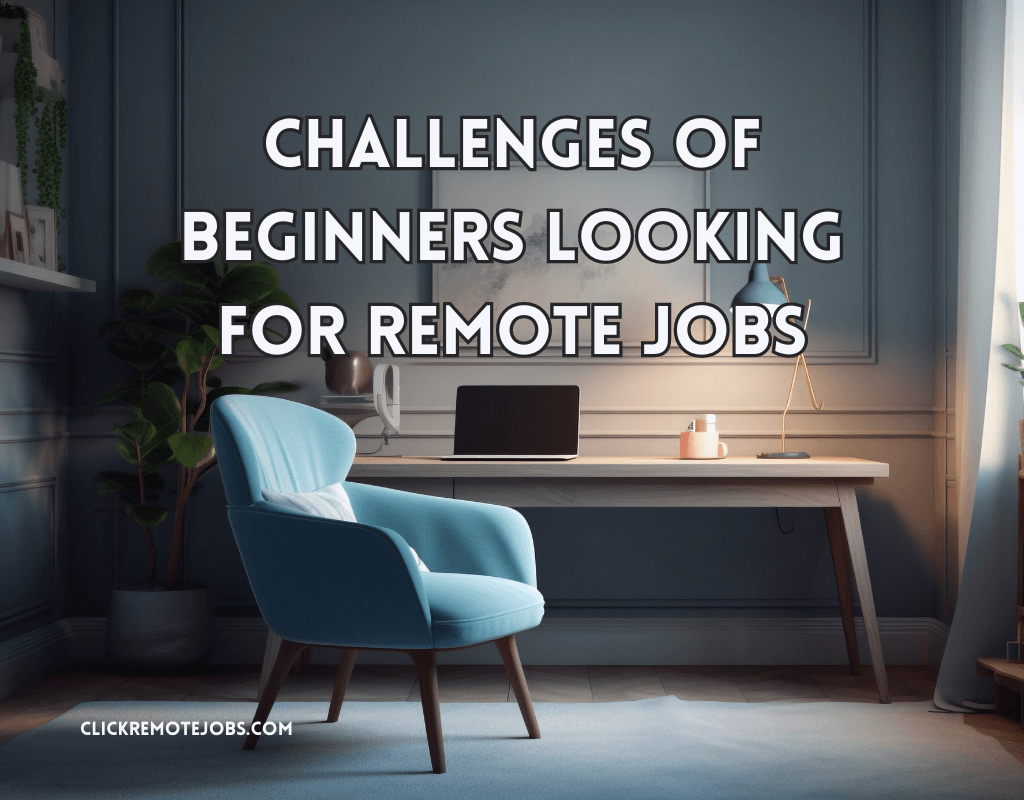Finding remote job opportunities can be an exciting journey for any newbie in the remote job market. On the other hand, it’s also important to acknowledge the challenges for beginners looking for remote jobs. As they called it “common hurdles” they encounter as they ride the road to the digital economy. In this blog, we will explore some of the said setbacks. Likewise, we will also share practical solutions on how to overcome them.
So, whether you’re a recent graduate, a career changer, or simply exploring new avenues, this is for you. Understanding and addressing these challenges will increase your chances of securing a remote job successfully.
Let’s delve into the obstructions that you might meet as a beginner seeking remote jobs. In the same vein, let’s discover effective strategies to overcome them.
Understanding Remote Jobs
Before diving into the challenges, let us define what remote jobs entail. Remote job refers to employment opportunities where you can perform tasks outside of a traditional office setting. The advantages of remote work include increased autonomy, reduced commuting time, and the ability to work from anywhere with an internet connection. Another point is that you can perform work tasks and responsibilities by utilizing digital tools, technology, and communication platforms.
Remote jobs can span various industries and professions, including but not limited to:
- Information Technology (IT): Remote software developers, web designers, system administrators, and IT support specialists.
- Customer Service: Remote customer support representatives, call center agents, and virtual assistants.
- Writing and Content Creation: Remote copywriters, bloggers, content marketers, and freelance writers.
- Marketing and Digital Marketing: Remote marketing managers, social media strategists, SEO specialists, and digital advertisers.
- Creative Fields: Remote graphic designers, illustrators, video editors, and photographers.
- Project Management: Remote project managers, coordinators, and agile scrum masters.
- Consulting: Remote consultants in various domains such as business, finance, human resources, and technology.
Challenges of Beginners Looking for Remote Jobs and How to Overcome Them
Challenge No. 1: Limited Professional Network
Finding remote job opportunities can be challenging for beginners. Especially, when you have a limited professional network. Or worst, you do not have a network at all. Unlike traditional employment, remote jobs often rely on connections and referrals. But don’t fret! To overcome that, there are several ways to expand your professional network and enhance your chances of landing a remote job:
1. Build Your Online Presence
Building an online presence is crucial for beginners looking for remote jobs for several reasons. Here are some key benefits:
Visibility and Discoverability: Creating an online presence through platforms like LinkedIn, Twitter, and professional forums increases your visibility to potential employers and recruiters. It allows them to discover your skills, experience, and qualifications, even if you haven’t actively applied for a job. Your online presence put you on the radar of remote job opportunities.
Networking Opportunities: In addition to the above reason, online presence further provides ample opportunities to connect and network with industry professionals, influencers, and like-minded individuals. By actively participating in relevant conversations, engaging with posts, and sharing valuable insights, you can expand your network and forge valuable connections. Networking can lead to referrals, recommendations, and even direct job offers.
Personal Branding: Developing an online presence as a beginner looking for remote jobs contributes to personal branding. Your online presence allows you to shape and control how you are perceived. Sharing valuable content and showcasing your unique strengths and perspectives, consequently, help you build a strong personal brand that aligns with remote job opportunities.
2. Join Remote Work Communities
Joining remote work communities is highly beneficial for beginners. Here’s why:
Industry Insights and Best Practices: Remote work communities are excellent sources of industry-specific knowledge and best practices. Community members often share their experiences, tips, and strategies for successful remote work. You can gain valuable insights by actively participating in discussions. Additionally, you will learn about tools and techniques on how to navigate jobs remotely. Lastly, you will stay updated about what’s industry trends.
Continuous Learning and Skill Development: Members frequently share educational resources, webinars, workshops, and online courses related to remote work skills and personal development. Engaging with the community allows you to expand your knowledge, acquire new skills, and stay competitive in the remote job market. Hence, remote work communities are rich sources of learning for beginners looking for remote jobs.
Peer Support and Collaboration: Remote work can sometimes feel isolating, especially if you’re new to the remote job. Remote work communities offer a sense of belonging and provide a space for mutual support. So, you can share your challenges, seek advice from experienced remote workers, and learn from their experiences. Collaborative opportunities, such as finding project partners or joining virtual coworking sessions, may also arise within these communities.
3. Attend Virtual Events and Webinars
Attending virtual events and webinars is a valuable investment of time. Let’s talk about the reasons why you should consider participating in these online gatherings:
Knowledge and Education: Virtual events and webinars offer a wealth of knowledge and educational opportunities. They are often hosted by industry experts, thought leaders, and professionals with extensive experience in their respective fields. As a result, you can gain insights into industry trends, emerging technologies, and the latest developments in your industry. The knowledge you acquire can enhance your skill set. As an effect, it makes you more marketable to potential clients or employers.
Access to Industry Experts: Virtual events and webinars often feature presentations, panel discussions, and Q&A sessions with industry experts. These experts are offering valuable guidance to attendees. Moreover beneficial to beginners looking for remote jobs. Having direct access to these experts allows you to ask questions, seek advice, and gain valuable perspectives. Building relationships with industry experts can also lead to mentorship or referral opportunities.
Stay Current and Engaged: Participating in virtual events and webinars allows you to stay current and engaged with your industry. It demonstrates your dedication to staying informed and continuously learning, which is highly valued by remote employers. Being up-to-date can position you as a knowledgeable and proactive professional. With that said, it increases your chances of getting remote job opportunities.
Challenge No. 2: Lack of Experience or Portfolio
One of the significant challenges faced by beginners looking for remote jobs is the lack of experience or a robust portfolio. Remote employers often prioritize candidates with a proven track record of remote work or relevant experience. Overcoming this hurdle requires creativity and proactivity:
1. Emphasize Your Transferable Skills
These are skills that can be applied across different industries, job roles, and work environments. We mention below the reasons why highlighting transferable skills is crucial for you:
Adaptability and Versatility: Remote work often requires individuals to be adaptable and versatile. Transferable skills demonstrate your ability to apply your knowledge and expertise to new situations and environments. In other words, you convey your flexibility and adaptability to remote work settings. Consequently highly valued by employers.
Time Management and Organization: Remote work often requires strong time management and organizational skills. Transferable skills in these areas indicate your ability to prioritize tasks, meet deadlines, and work independently without constant supervision. By emphasizing your time management and organizational abilities, you convey your capacity to stay focused, productive, and accountable in remote work scenarios.
Cross-Functional Collaboration: Remote work often involves collaborating with team members from various departments or disciplines. Transferable skills enable you to effectively communicate, collaborate, and contribute to multidisciplinary teams. Emphasizing these skills demonstrates your aptitude for working with diverse individuals and your ability to bring different perspectives together to achieve common goals.
2. Offer Freelancing and Volunteer Work
Freelancing and volunteer work offer avenues for skill development. Similarly, incorporating these into your career strategy allows you to a better position when applying for remote jobs. Let’s dive into why beginners seeking remote work should jump to it:
Portfolio Building: Freelancing and volunteer work allow you to build a strong portfolio showcasing your work and achievements. Remote employers often look for tangible evidence of your skills and capabilities. By including relevant projects from your freelancing and volunteer experiences in your portfolio, you provide concrete examples of your work and demonstrate your ability to deliver results.
Testimonial and Reference Opportunities: Successfully completing freelancing and volunteer work can lead to positive testimonials and references. These testimonials provide social proof of your skills, work ethic, and professionalism. Having reputable references from freelancing clients or volunteer supervisors can boost your credibility and increase your chances of securing remote job opportunities.
Demonstration of Initiative and Proactivity: Offering freelancing and volunteer work illustrates your initiative and proactivity in pursuing professional growth and contributing to meaningful projects. Remote employers value individuals who take ownership of their career development and seek opportunities to contribute beyond traditional employment. By showcasing your freelancing and volunteer work, you highlight your motivation, resourcefulness, and willingness to go the extra mile.
3. Personal Projects and Side Hustles
These activities contribute to your personal and professional growth. In addition, it makes any beginner a more attractive candidate for remote job opportunities. Let’s learn why personal projects and side hustles are significantly advantageous for beginners:
Skill Enhancement and Diversification: Personal projects and side hustles provide opportunities to enhance and diversify your skill set. By working on self-directed projects, you can explore new technologies, learn new tools, and develop expertise in areas that interest you. This continuous learning and skill development make you a more well-rounded and adaptable professional.
Entrepreneurial and Business Skills: Side hustles often involve managing your own business, even on a small scale. Engaging in entrepreneurial activities helps you develop valuable business skills such as marketing, project management, client communication, and financial management. These skills are transferable and can be applied to various remote job roles, especially those that involve working independently or with clients.
Income Generation and Financial Security: These two activities have the potential to generate additional income, providing you with financial security and flexibility. This extra income can help cover expenses, fund personal projects, or serve as a safety net during periods of job transition. Additionally, having a diverse income stream can make you more resilient in the ever-changing job market.
Challenge No. 3: Remote Job Search Strategies
Finding remote job opportunities requires a different approach compared to traditional job hunting. Unlike traditional job hunting, physical resumes and in-person interviews play a significant role. However, applying for a remote job relies on online submission and virtual interviews.
Here are some effective strategies to maximize your chances:
1. Remote Job Boards and Websites
Explore dedicated remote job boards and websites, such as Remote.co, No Desk, and We Work Remotely. These platforms curate remote job listings, making it easier to find suitable opportunities.
2. Networking and Referrals
Tap into your expanded network by leveraging connections, referrals, and recommendations. Building meaningful connections and leveraging referrals can open doors to unadvertised positions.
3. Directly Contacting Remote Companies
Take the initiative to reach out directly to remote companies you’re interested in. Craft personalized emails expressing your interest, outlining your qualifications, and explaining how you can contribute to their organization remotely.
Challenge No. 4: Cultivating Remote Work Skills
Remote work requires specific skills and attributes to thrive in a virtual work environment. To enhance your remote job prospects, focus on developing the following competencies:
1. Communication and Collaboration Skills
Strong communication and collaboration skills are vital for remote work success. Practice effective written and verbal communication, actively participate in virtual team projects and leverage collaboration tools like Slack and Trello.
2. Self-Motivation and Time Management
Remote work demands self-discipline, motivation, and excellent time management skills. Establish a productive routine, set goals, and utilize productivity tools to stay organized and meet deadlines.
3. Technical Proficiency
Ensure you possess the necessary technical skills relevant to your desired remote job. Familiarize yourself with remote collaboration tools, project management software, and other industry-specific applications.
Conclusion
Navigating the world of remote jobs as a beginner may come with its fair share of challenges. However, armed with the right knowledge and strategies, you can overcome these hurdles and embark on a successful remote career. In this blog post, we have explored the various challenges that beginners may encounter while searching for remote jobs, and provided actionable insights to help you overcome them.
While the lack of in-person interaction can be a challenge, remote work offers unique advantages. For instance, flexibility, work-life balance, and the ability to work from anywhere. Showcase your ability to work independently, communicate effectively in virtual settings, and manage your time efficiently.
Stay up-to-date with remote work trends, industry developments, and emerging technologies. Continuous learning will help you adapt to the evolving remote work landscape and position yourself as a valuable asset to clients and remote employers.
To sum up, the challenges of beginners looking for remote jobs can be overcome with perseverance, a proactive approach, and the right skill set. Stay determined, remain adaptable, and leverage the wealth of resources available to you. With these strategies in place, you are well on your way to securing a rewarding remote career.
Subscribe to our newsletter for the latest updates on remote jobs and remote work tips.
For more insights and tips on finding remote jobs, exploring remote work culture, and mastering remote work skills, be sure to stay connected with our blog. Together, let’s unlock the vast opportunities that remote jobs offer and embrace the future of work!


